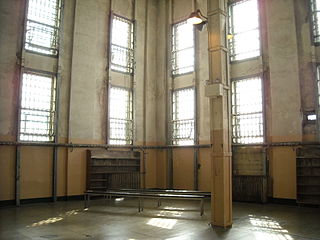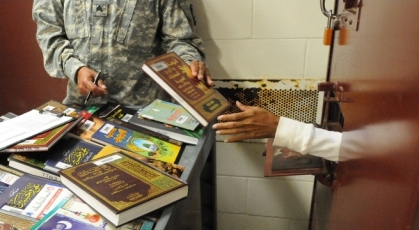
We often talk about books as escapes from mental prisons, but they have a place in physical ones as well. In US prisons, libraries play a valuable role as centers of entertainment and knowledge for the over 2.25 million adults incarcerated. They also decrease the likelihood that inmates will reoffend once they are released.
Prison libraries can take multiple forms. In some of the largest correctional facilities, libraries fill entire rooms. In others, the library consists of only a single cart of books pushed to various cells. Some prisons have budgets specifically for stocking their libraries. Others rely only on whatever book donations they receive.
Over the years, the American Library Association has done several surveys of prison librarians and brought back assessments of their collections. In one survey, these librarians described the following:
- “Small but well balanced collection, similar to a public library
- Heavy use of homegrown newspapers
- Prisoners love studying the human body
- We cater to the GED program and the 2 year college program
- General fiction, inspirational books, humor
- Wide range of books that reflect the interest of all ethnic groups
- Collection built around ethnic interest and reading levels
- Career oriented software”
The patrons they served loved books by Stephen King, Danielle Steele, John Grisham, Donald Goines, African American authors, and authors of Westerns.
Ultimately 95% of inmates will reenter broader society, and prison libraries provide them with the skills to do so successfully. Libraries allow these individuals to learn about employment and job seeking skills, and as Daniel Marcou, a correctional librarian at Hennepin County Library, states, “I wanted to convey to residents that reading and information can help to free all from our past or places where we might not want to be in life.”
Quartz recently released an article on the relationship between access to books and the rate of recidivism; they concluded that reading reduced reoffense rates. For inmates in the Changing Lives through Literature program, participants had a recidivism rate less than half that of inmates in the general population. The founder of the program, English Professor Bob Waxler, asserts that this change occurs because reading “teaches empathy, complexity, how to face shame, and personal dignity. By relating to fictional characters, readers shift perspectives and make choices they wouldn’t otherwise.” The Rand Corporation’s 2013 study on education and prison reform agrees that reading and education programs do make a difference in the ways that currently incarcerated people approach the world and life after prison. Even when removing the human element and looking strictly at the financial aspect of these programs, education is very cost effective for prisons; for every $1 spent on education and reading, incarceration costs decrease by $4-$5.
All of this is to say that access to books and education provides new opportunities and perspectives to people. Though may of us don’t consider libraries to be connected to prisons, they do exist in correctional facilities, and their presence there does matter. Even in the darkest of mental and physical places, reading makes a difference.

Image Attributions:
Daniel Ramirez, “Alcatraz – Prison Library,” 2010.
Jordan Miller, “Captive Browses Books at Camp 5 Guantanomo,” Miami Herald, 2011.

Interesting article but shocked at the 2.5 million prisoners in the US. That seems staggeringly high. Books must a life-line for so many though – something we take for granted.
LikeLiked by 2 people
I agree. It is a horrifically large portion of the population.
LikeLiked by 2 people
Interesting. Books most definitely have an impact. On the Longmire television show, the Sheriff of Absaroka County reads “Of Mice and Men” and then uses the last scene when he interviews for a new deputy. He makes the candidate read the book and asks them what they would do. Each response reveals so much about each person: whether they can follow orders, how they feel about people with mental challenges, how they respond in a crisis…
What would we do without books, without writers, without readers?
LikeLiked by 1 person
That sounds like a compelling take on the subject. I haven’t seen much of Longmire, but that is a great way of integrating the relationship between personalities and how people interpret books.
LikeLiked by 1 person
I think this is great and I think it needs to be implemented more than other forms of entertainment for inmates. Perhaps it’s more difficult with mental prisons, but for inmates in physical prisons, this is the kind of thing we should be paying for, not high-def TVs or goodness knows what else they get. Prison is meant to be a punishment, after all. Yet, too often it’s a luxury (at least in the US.) I think modifications need to be made and perhaps this is one of them. Books are relatively inexpensive and can make real change in the world.
Though, I’d be worried about some of the types of books offered to them. Stephen King? Is that really the best choice for dangerous inmates? I’m a little skeptical about that one.
I’m a little skeptical about that one.
LikeLike
There is a lot of interesting research that has been done on how prisons curate their libraries and what books they choose to ban. Sometimes the censorship makes sense – very violent or sexual books are often banned – but other times the choices seem a little more pointed. The Texas Department of Justice, for example, has banned a lot of books about civil rights, the judicial system, and prison reform. (I think Texas has something like 15,000 books listed on its list of books banned for prisons.)
I do wish that the state would support more programs for books in prisons though. Giving people the tools to succeed in life after prison is, to me, an important part of the system.
LikeLiked by 1 person
Great post! 👍🏻
LikeLiked by 1 person
Thanks, Megan!
LikeLiked by 1 person
Really interesting post. I think books are so important in all stages of life and learning. Sometimes a skilled writer can make it feel like they either know you or are addressing you specifically and that can have such a powerful impact on your views and outlook. I’d love to see the banned list and the reasons behind them.
LikeLiked by 1 person
Books really can do magical things for people. Unfortunately most prisons don’t publicly publish their banned lists, but the LA Times recently had an article that listed a few of them as well as the possible rationales behind the censorship.
http://www.latimes.com/books/jacketcopy/la-et-jc-texas-prisons-books-20160927-snap-story.html
LikeLiked by 1 person
Decriminalize most drugs and watch the prison population and the crime rate drop. Instead of incarcerating, offer help through detoxing and counseling. Less expensive and more effective for most in the long scheme of things. Throwing away lives behind bars is ludicrous except for a certain portion of hardcorp individuals. Just my two cents.
–Michael
LikeLiked by 1 person
I agree that a lot of people are in prison who shouldn’t be, and their incarceration often just makes it more difficult from them to find jobs, relate to their families, and have mundane lives once they are released.
LikeLiked by 1 person
A really interesting post. I firmly believe that books can and do change lives, and that reading is vital in helping to build empathy. Reading fiction, in particular, helps people to imagine other ways of living and being in the world.
LikeLiked by 1 person
Definitely. Access to books of all kinds is vitally important. Wasn’t there a fairly recent study that reading things like “Harry Potter” causes people to feel more empathy? Learning to step into other people’s shoes through reading is one of those seemingly insignificant things that makes us better.
LikeLiked by 1 person
I’ve read several studies about how reading builds empathy in children and young adults, as well as helps them negotiate issues and problems they come up against in life. I would think it would be similar for the prison population, many of whom may have had disrupted/ truncated education experiences.
LikeLiked by 1 person
Thanks for sharing this information, Kristen. I remember reading about a volunteer program where community college teachers were running a Shakespeare workshop in different prisons across the country. I’m definitely in support!
LikeLiked by 1 person
Programs like that are wonderful! It’s good to hear that they exist on a national level.
LikeLiked by 1 person
So THIS is why Andy wanted the library at Shawshank state prison.
LikeLiked by 2 people
One of the may reasons, I think. 😉
LikeLiked by 1 person
Reblogged this on Journal Edge.
LikeLiked by 1 person
Very early on in my 14 year prison sentence, I realized that I would have the opportunity to read every book I ever wanted to. And I did! The only caveat was that when I’d finished a book many more were added to the list of books ‘I ever wanted to’. I think I read more than 200,000 pages of books during my time down, something I would never have been able to do if I’d been anywhere else. Other inmates came to associate me with my book collection and the fire hazard that existed in my cell. You’ve inspired me. I think I might may need to write something about my relationship to books while on the inside.
LikeLiked by 2 people
That is an impressive number!
I’ve read a bit from prison librarians about their experiences, but I don’t know that much has been written from the other perspective. If you do decide to write about that time, you would certainly have an audience for it.
LikeLiked by 2 people